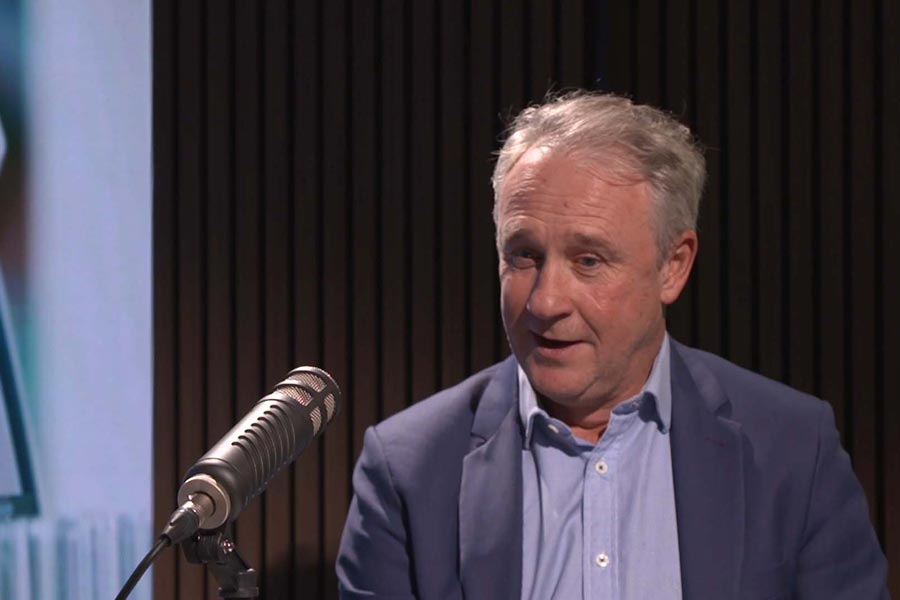Is Ireland Poised to Disrupt the Global Pharma Game? Inside the Bold Vision of Luke O’Neill and Jeremy Skillington
When you think about biotech, what pops into your mind? Maybe the towering giants in Boston and San Francisco? Ireland, the underdog with huge ambitions, is now stepping into the ring, fueled by decades of smart moves and foreign investments. But here’s the kicker—are we just gonna be the factory floor for big pharma or can we actually birth the next game-changing biotech titan right here? That’s exactly the convo between Luke O’Neill, the biochem genius at Trinity College, and Jeremy Skillington, the hustler CEO of Poolbeg Pharma. From spilled secrets about why Elan didn’t quite become Ireland’s Novo Nordisk, to revolutionary cancer breakthroughs battling the dreaded side effects of immuno-oncology—this chat is a deep dive into what it takes for Ireland to not just play in the big leagues but to lead them. Buckle up, because this isn’t your typical science talk—it’s a blueprint for bold moves and big wins in the pharma game. LEARN MORE
A conversation between Luke O’Neill, professor of biochemistry in the School of Biochemistry and Immunology at Trinity College Dublin, and Jeremy Skillington, chief executive of Poolbeg Pharma
LO’N: We’re here to talk about the pharma and biotech sector in Ireland. Do we aspire to be as good as Boston or San Francisco? What do we need to do to achieve that?
JS: Yeah, as you know, actually, where we first met was in the Bay Area, when I was working with Genentech, and you were getting Opsona off the ground and Genentech made an early investment.
I think Opsona was a good example of one of the early biotech companies and there’s been a few that have come through since then.
Obviously, we both worked together at Inflazome, which was a fantastic four-year experience, and now I’m with Poolbeg Pharma.
Thankfully, you’re on our board.
So we go back a while. I think Ireland has fantastic ambitions to become a biotech hub. I think we’ve done very well over the last 50 years or so to attract these foreign direct investments from the big pharma companies.
I think 13 of the top 15 companies are based here primarily doing manufacturing. So the drugs have already been discovered.
They’ve been through clinical trials, they’ve got their approval and then they send them to Ireland to be manufactured. And then we export them, which is fantastic, because it employs 50 to 60,000 people in the country.
But what we’d like to see, I think there’s great impetus right now that we can become like the San Francisco Bay area, where we could start companies.
We can talk a little bit later on about, you know, spinning companies out of academia, starting these small, little hubs, these little biotech companies, getting entrepreneurs in, raising capital, doing your pre-clinical studies or clinical studies and ultimately building a company.
And maybe the next big pharma company comes out of Ireland. The likes of Ibec do a lot of work to try [and] bring everybody together to achieve that goal. So we’re hopeful.
LO’N: Why did Elan not become Novo Nordisk? Elan had a chance, didn’t they, to become a multinational, global pharma company from Ireland?
JS: I guess they did. What’s interesting with the pharma companies is that if you get too good, the really big guys like the Pfizers of the world would like to acquire you.
They’re looking to supplement their own pipelines. And I think Elan did a terrific job. It got some very important drugs into approval. Tysabri being one, for multiple sclerosis.
What I will say, which I think is of advantage to the next generation of biotech companies, they trained a lot of people. A lot of scientists.
LO’N: It was like a university. So many alumni came out of that company that are populating many aspects of Irish biotech.
JS: You’re many years in academia and you’ve dipped your toes into giving scientific advice to a lot of pharma companies. I mean, what’s special about pharma?
LO’N: It depends on what way you look at it. If you start with the market, there’s a vast unmet medical need for all the diseases and that’s why big pharma is so successful.
Pharmaceuticals is a very important thing, because we will discover new medicines for horrible diseases.
That’s the first thing, right? And then obviously, commercially, it’s very important for countries and companies. I always remind people a third of all pension funds are invested in pharma.
If pharma goes down that’ll have a massive hit on pension funds. In other words, the pharma sector is embedded in the global economy, but remember, it’s trying to discover new medicines [for] diseases that really need them and there’s an endless appetite for this.
So therefore, commercially, it’s really exciting to be part of it. And then if your job eventually is to discover a new medicine, isn’t that a laudable goal, as opposed to making a widget?
The IT sector, that’s simple. I’m not knocking them, but pharma is a very different, noble goal.
JS: Yeah, I think you’re right. I made a statement last year about what gets you out of bed in the morning, and it’s that kind of ability to actually help people.
We talked earlier on about these diseases of ageing. But wouldn’t it be great to have an impact? And you know, whether it is self-serving as we get older, helping friends and family and even yourself.
LO’N: We should talk about Poolbeg for a minute. I’ll tell you why that’s really important. So people might not know what Poolbeg is doing, but there’s a big breakthrough in cancer.
As you know, Jeremy, immuno-oncology is fantastic, checkpoint blockade and CAR-T but there’s a side effect: the immune system is being stimulated to kill the tumor.
But the trouble is, it has these other effects on the whole body and Poolbeg is trying to develop a drug to stop the side effects, which would have a big impact.
JS: I’m glad you brough that up. You think back to the evolution of cancer treatments. The blunt approach of chemotherapies just killing fastgrowing cells.
And then you get a bit more selective when you understand what gene is driving tumour growth you can inhibit that.
But now they are more universal. Let’s get the immune system to go after tumors, which is not an easy trick but I think they’ve figured [it] out very well. That’s why, Luke, we have you on board with your immunology background.
One of the unfortunate side effects of these cancer immunotherapies is this ‘cytokine release syndrome’, where your immune system is overactive, and that can sometimes be fatal.
So we’ve got a drug called POLB 001 which will inhibit that, prevent that cytokine release syndrome happening, [and] which will allow the healthcare system to get more drugs to more cancer patients.
I’m wildly excited about that. We’ve got a clinical trial about to begin to get in-patient proof of concept data. We talked about pharma earlier on, our ultimate goal is to partner that programme with pharma companies.
LO’N: I was at a conference last week in Stockholm and I met Carl June. I told him all about Poolbeg, so I’m working hard!
He knows the massive unmet need there is to stop those side effects and Poolbeg might have a drug to do that, so he said to keep him posted.
JS: Oh, let’s do that. Carl June is the godfather [of this field], and I think he’s done tremendous work.
LO’N: Given that the target at Poolbeg is going after something called p38, that was discovered in academia, what do you make of the academic axis here and how the academic side of this story feeds into the commercial side?
JS: It’s an interesting question, Luke. You’re the academic and I’m a biotech entrepreneur, but I’ll answer the question. I’m from the outside looking in.
There’s a lot of really fantastic science going on in Ireland. I think there was criticism in the past that maybe some of it was kind of dying on the vine because you couldn’t translate that into new companies.
Maybe the funding wasn’t there, or the enthusiasm wasn’t there.
I do think that’s changing. I think through SFI or Research Ireland, they have funded a lot of very interesting projects.
More recently there’s been the ARC Hub, as it was called, which takes these high-priority academic projects that have potential.
They’re not companies now, but have potential, [so] let’s fund them to do some of those killer experiments.
So it’s like what I was saying earlier on about this kind of nascent biotech community, and you’re trying to build it from the ground up.
There are projects that maybe will become the next Inflazome, the next Poolbeg, the next Elan.
LO’N: Then what I would always say, it’s partly because of complexity, right?
To try to crack a really horrible disease like Parkinson’s, it’s intensely complicated. Often academics are at the coalface trying to figure out new pathways and new processes that could well yield new therapeutics.
They wouldn’t have the ability to make a drug, of course, because universities don’t make pharmaceuticals.
So they’ve got to talk to big pharma, haven’t they?
And maybe spin out a company or get a biotech involved, and that’s the next step in this process, isn’t it?
The rate of discovery at the moment, Jeremy, I think you’d agree, is incredible.
JS: It is incredible. I think back to when I was in college 25 or 30 years ago, how far science has come.
There’s been a lot of investment and a lot of really smart, clever people who have been in pharma for 20 years and they are tired of bureaucracy.
Let’s get out of pharma and start a biotech company. There’s been a lot of that. As you say, it is for-profit, there are venture capitalists who are investing pension fund money to start these companies.
The cycle goes around.
Big pharma acquires these companies and the entrepreneurs start new companies — it’s a circular industry in that sense. It’s well executed in the US.
We talked about the San Francisco Bay Area and Boston.
A lot of startups are built and then acquired and you start the cycle again. We’d love to see the same in Ireland.
LO’N: There’s always been a criticism of Europe, not just Ireland, that they can’t commercialise. The American system seems more agile.
Well, first of all, money, right? What’s going on there?
Is it that Americans are less risk averse? Is that a big part of it? What is the difference? Because the European Union would love to know.
JS: Yeah, it would. I spent 11 years in San Francisco, half of it in academia, half in biotech. And people talk about the American ‘can-do attitude’.
They kind of jump off cliffs and say, ‘let’s assemble the plane on the way down’. I think Europeans, maybe it’s a cultural thing, we’d rather assemble it on the cliff and hope for the best. We are more risk averse.

I think, financially as well, the US is willing to invest in high risk but high reward. I think we prefer medium risk and medium reward. I think there’s certainly a risk aversion.
And the other point I noted, and it’s been a well-worn story that failure in America is not a black mark. You know, people just say, ‘I’m unlucky’, and you move on.
You learn your lessons and you try again.
Whereas people here maybe don’t jump in for that fear of failure.
LO’N: Our first company failed. And then we kept going, didn’t we?
JS: We did!



















Post Comment